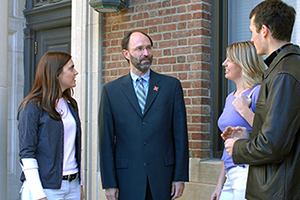Dr. John Anderson, Baird Family Professor of Economics at the University of Nebraska–Lincoln College of Business Administration, spoke to the Nebraska Chamber of Commerce & Industry at the 2013 Nebraska Policy and Issues Tax Summit on November 18. He discussed modernizing the tax code by eliminating tax exemptions and deductions to broaden the base revenue. This would allow for lowering rates across all tax brackets.
“Simplifying exemptions will create a more efficient tax system and distorts the economy less. Nebraska’s income tax shoots up in the upper brackets. That’s not a good feature of a state tax system because it gives firms incentive to avoid high levels of taxation, which is easy to do these days when both capital and labor are pretty mobile,” Anderson said.
Sales tax was also a focus of Anderson’s talk.
“Nebraska’s economy is strong because income tax, sales tax and property tax make up about one third each of our revenue sources. The problem is the sales tax base is shrinking. It was originally designed to tax goods rather than services and the economy has shifted toward services. When you combine that with lost income due to failure to collect tax on internet sales, you can see where modernization is needed.”

Dr. Anderson talks to CBA students
Anderson, who served for the White House in Washington D.C. as a senior economist for the chief of staff of the Council of Economic Advisors, believes tackling the tax issues will be tough.
“We need to broaden the sales tax if we lower rates. The big money is in taxing food, health care or education. You have to address those big issues if you’re going to have an impact. For those concerned with hitting lower income families harder, I suggest putting a credit on income tax on the lower end to relieve their sales tax burden.”
According to Anderson, public spending is the final factor to be addressed.
“We should decide how much we want to spend on state and local services and then figure out the best way to finance it. That is a first principle but it’s currently not how decisions are made.”
Anderson followed his talk with a related presentation at the National Tax Association (NTA) conference in Tampa. The NTA is considered the leading association of tax professionals advancing the theory and practice of public finance.
“I presented a paper on the state use tax which looks at what happens when someone buys a good on the internet. If you don’t pay the state sales tax, then you are liable for the equivalent which is the state use tax. I looked at how many people reported use tax and the answer is not many. My paper was about how little revenue we actually collect.”
Published: December 4, 2013